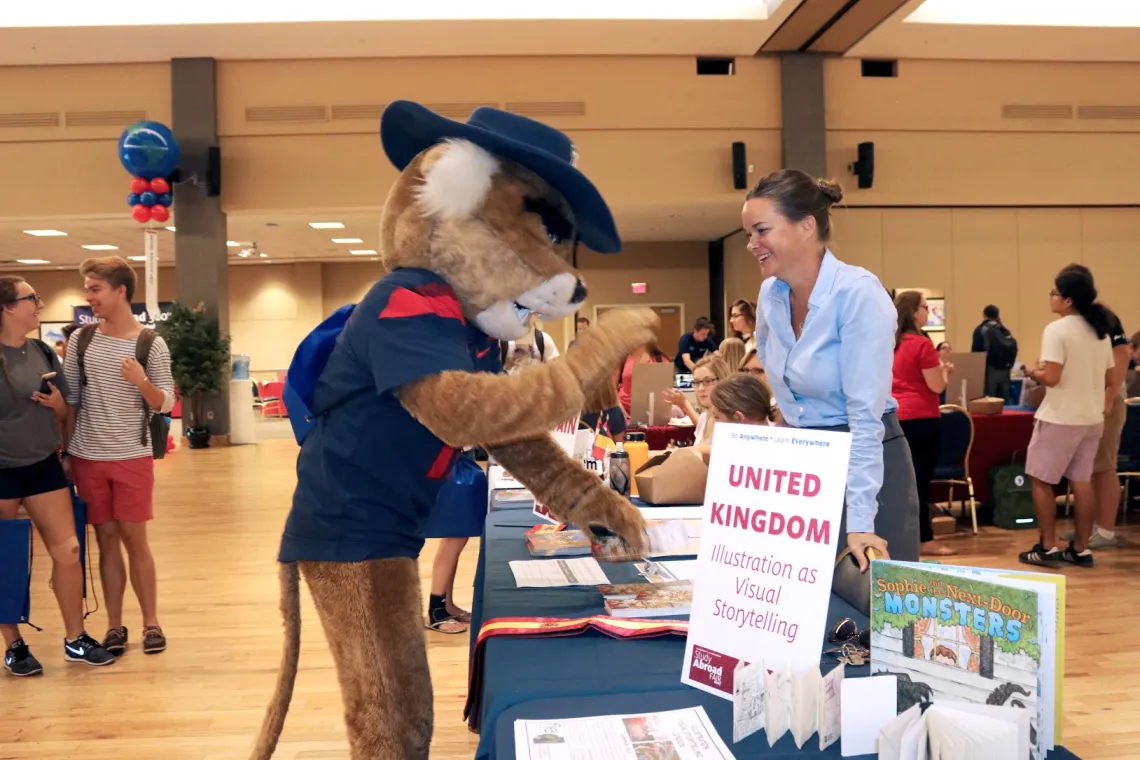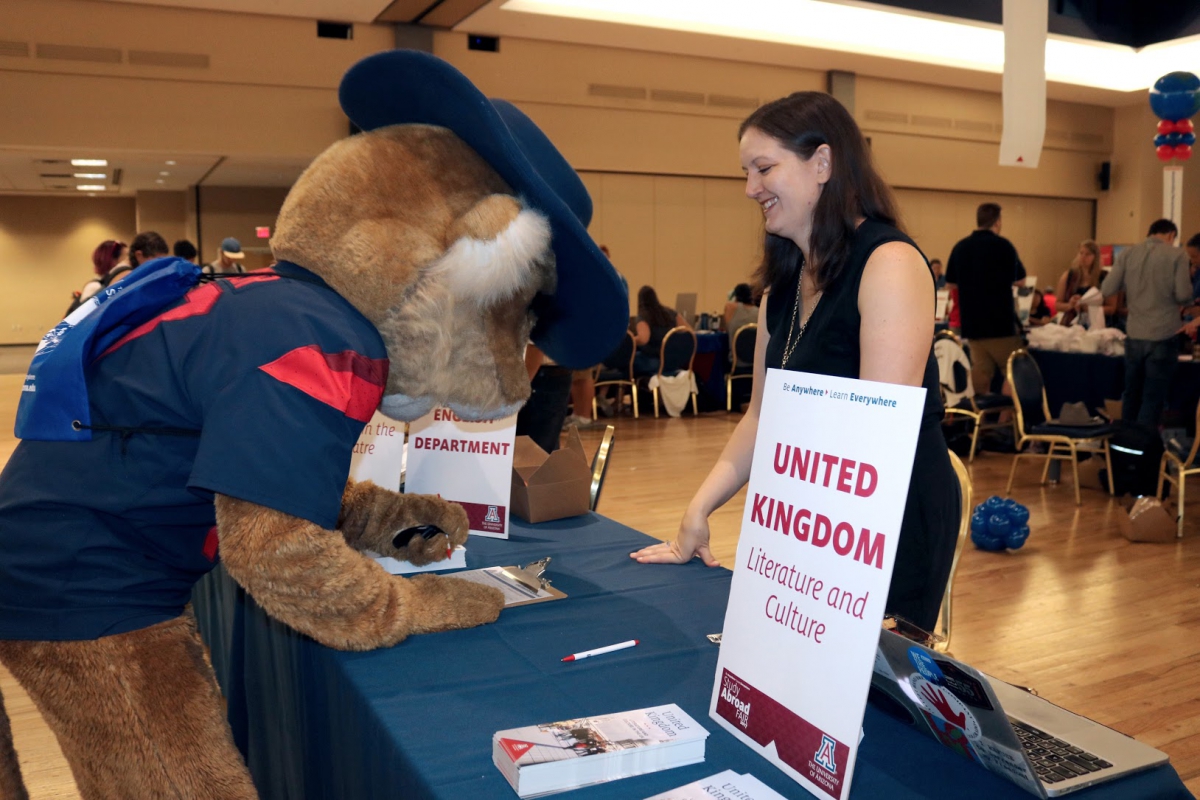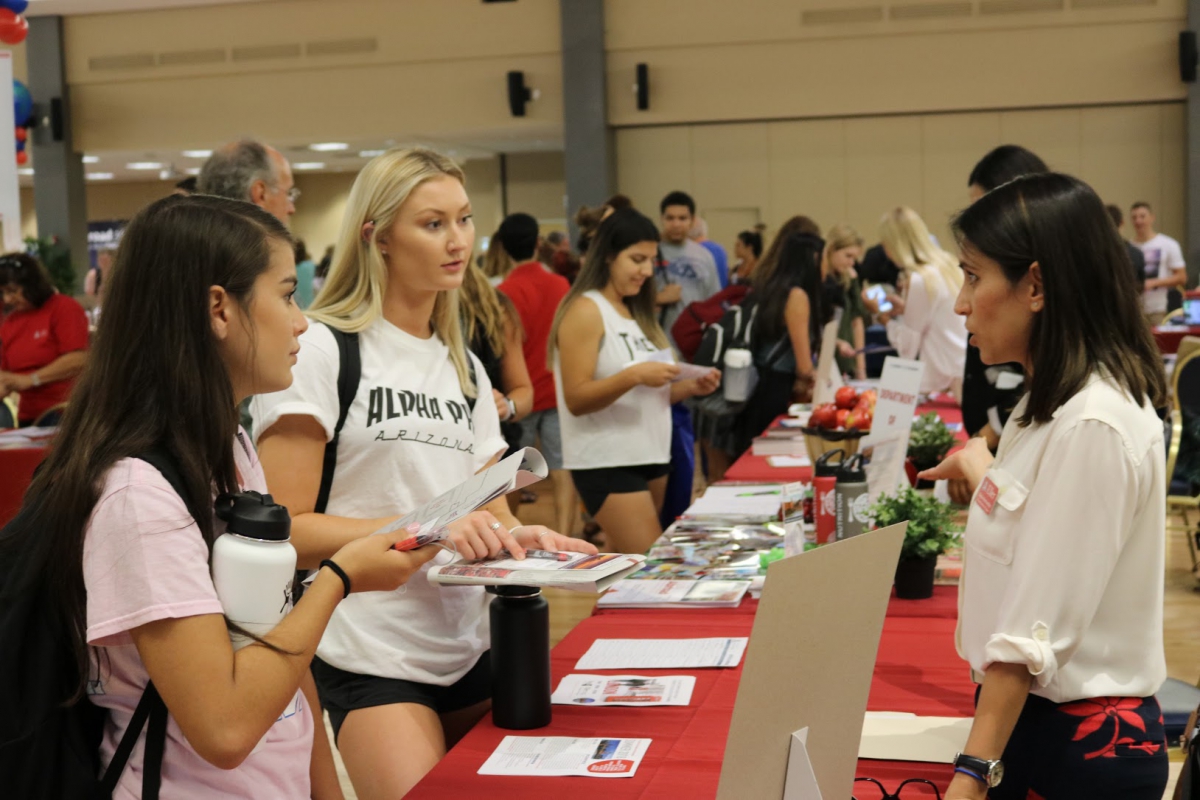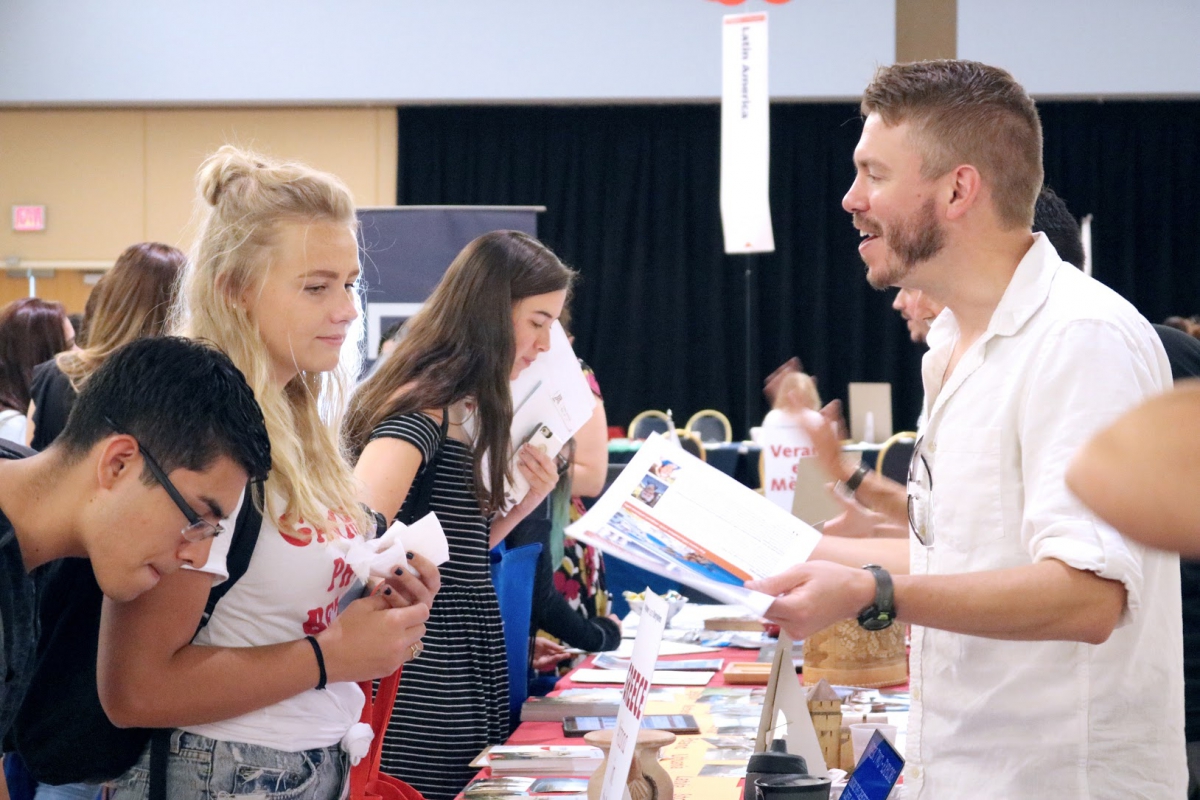Study Abroad Fair Highlights Trends in International Education

 More than a thousand students, faculty and staff filled the Student Union Grand Ballroom on September 13th for the 2017 Study Abroad Fair, the biggest event of the year for UA Study Abroad. Dozens of colorful tables lined the hall, inviting students to explore the latest international opportunities, an array of more than 100 programs across 60 countries.
More than a thousand students, faculty and staff filled the Student Union Grand Ballroom on September 13th for the 2017 Study Abroad Fair, the biggest event of the year for UA Study Abroad. Dozens of colorful tables lined the hall, inviting students to explore the latest international opportunities, an array of more than 100 programs across 60 countries.
“I didn’t realize there were this many countries we could travel to and all these cultures we could experience,” said Misarai Bojorquez, a sophomore majoring in Special Education. A fellow sophomore, Ramses Buelna, had a specific goal in mind. “I was looking to see programs related to architecture, my major, and I am very interested in what I saw. I’ve never been anywhere except for the United States and Mexico, so I would like to travel before I finish school.”
UA Study Abroad, located within the Office of Global Initiatives, works with partners and faculty members to offer international programs ranging from one week to one year. Through immersive options, students research, study and conduct field work abroad, gaining academic credits along the way. This year, UA Study Abroad is taking additional steps to encourage students to develop a greater sense of global responsibility and citizenship.
“As the world becomes more connected, UA Study Abroad is beginning to place an increased emphasis on intercultural competence,” said Harmony DeFazio, director of UA Study Abroad and executive director of the Arizona Global Mobility Lab. “We’re taking steps to ensure that the UA is a leader in this space. We want all UA students to be ready to succeed in a global context, before and after graduation.”
Sumayya Granger, associate director of the UA’s Center for English as a Second Language, defines intercultural competence as the ability to interact appropriately from the other’s standpoint – and effectively from our standpoint – with people of different cultural backgrounds.
 “We are living in an increasingly globalized world, and most of us have had or will have interactions with people of different cultural backgrounds, and it is to everyone’s benefit for these interactions to go well,” said Granger, who also teaches Intercultural Competence: Culture, Identity, Adaptation and Intercultural Relations through the College of Humanities. “Intercultural competence helps us understand situations from different perspectives, fostering critical thinking and creativity.”
“We are living in an increasingly globalized world, and most of us have had or will have interactions with people of different cultural backgrounds, and it is to everyone’s benefit for these interactions to go well,” said Granger, who also teaches Intercultural Competence: Culture, Identity, Adaptation and Intercultural Relations through the College of Humanities. “Intercultural competence helps us understand situations from different perspectives, fostering critical thinking and creativity.”
Based on research and input from faculty and experts in the field, UA Study Abroad recently identified intercultural competencies to measure upon a student’s return from abroad. According to a survey of UA students who studied abroad during the summer of 2017, 97-percent of respondents said they had an increased ability to work effectively and appropriately in diverse interactions.
“We are working to make study abroad more of a cultural experience than a tourist one,” said Liudmila Klimanova, assistant professor of Russian and Slavic Studies and organizer of the Arizona in Kazakhstan program. “We want students to see the landmarks, but also to interact with people to see how they live, and that’s how we deliver cultural education right now. Kazakhstan is a bit atypical for an American student, but they learn so much by having this unusual experience.”
DeFazio acknowledges that international travel inherently encourages growth in intercultural competence among most students, but believes the next generation of study abroad will include adding layers to programs before, during and after the journey.
“We’re striving to make each experience even more meaningful so students have a solid foundation to tackle problems that require a global response,” DeFazio added. “We plan to continue to work with faculty to encourage and measure intercultural competence among study abroad students in the coming months.”
UA Study Abroad is also working to advance experiential programs in order to provide students with a hands-on approach to learning. “We’ve been working with faculty for some time now to lay the groundwork for experiential learning programs that really tap into this active approach,” explained DeFazio.
UA Study Abroad currently offers dozens of experiential learning options across nearly 20 countries, allowing students to apply classroom learning to real-world challenges. Experiential programs include service learning, research, field work, internships and clinical shadowing.
“In our education system, you read, you write, you take exams and you are expected to learn that way. But through study abroad, I heard stories in the community and did hands-on work,” said Christy Fierros, a senior Environmental Studies major who participated in the Climate Justice program in Costa Rica. “It was eye opening to see the things I’ve been studying for the past four years in real life. Just to be in a new country was amazing. It really gave me that sense of purpose all over again.”
Roughly 1,200 UA students studied abroad during the 2016 to 2017 academic year, up 3.5 percent from the previous year. It’s a number UA Study Abroad is actively trying to increase.
“We’re working to make study abroad accessible to all students and we’re taking steps to improve diversity and access to our programs,” said DeFazio. “We want students to know that some study abroad programs cost less than a semester in Tucson, and there are many scholarships and grants available. If a student is committed to study abroad, in most cases, we can make it work.”
UA Study Abroad is managing the new CDH Charitable Foundation Study Abroad Scholarship, which seeks to encourage high need, high achieving UA students to study abroad. Awards up to $8,000 are available for spring 2018 semester-long programs, with preference given to first-generation college students. Students may also find national scholarships to study critical-need languages abroad, as defined by the U.S. Department of State.
“I come from kind of a rough financial background and when I heard the Arizona in Kazakhstan program was really great, I looked for funding and found it. It turned out being the best experience of my entire life,” said Tyler Hodgin, a senior majoring in Political Science and Russian. “I was able to get a Gilman scholarship and because I chose Kazakhstan, a very underrepresented location in the world, they were willing to give me a little more funding. On top of that, through the School of Government & Public Policy, they offered me a stipend for my airfare.”
UA students interested in global issues also have multiple opportunities to get involved on campus, regardless of whether they participate in study abroad. Colleges and departments will host globally-focused events during International Education Week from November 13 through the 17. Students may also participate in an internationally-oriented 100% Engagement experience, such as the UA Refugee Project, Tech.Global or the Global Ambassador program.
According to Granger, becoming a true global citizen starts at home.
“It is helpful to read some resources on intercultural competence to see what tools and skills will be most beneficial in a variety of situations. It’s important to interact meaningfully and with an open mind with people from different cultural backgrounds than your own and to seek out those interactions no matter where you find yourself.”
More Info:
Students interested in UA Study Abroad should visit studyabroad.arizona.edu to get an idea of program and funding options. Students may also call the front desk at (520) 626-9211 to book an appointment with a coordinator. UA Study Abroad is located in the University Services Building at 888 N. Euclid Avenue, Room 301. Faculty members interested in creating a study abroad program should contact Harmony DeFazio at defazioh@email.arizona.edu.

